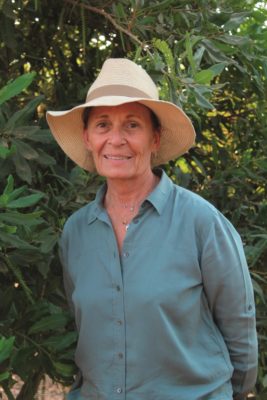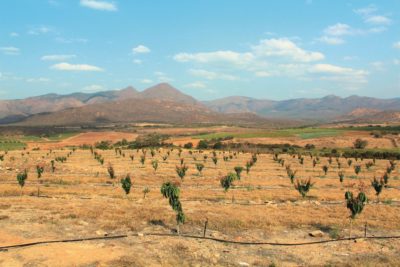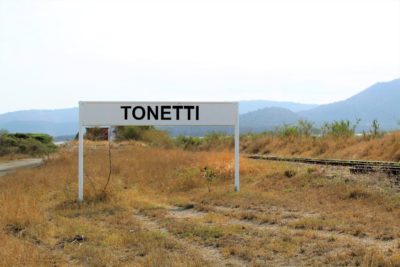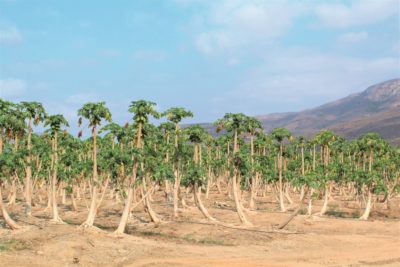Little remains of the Italian heritage of Low’s Creek and the community of settlers that coloured the landscape with fruit and vegetable farming in the 1900s to 1980s. But Giovanna Secco, one of the last remaining Italian settlers, has upheld her family’s passion for farming, turning Low’s Creek into a hub of papaya and macadamia production.
 Born in Australia of Italian descent, Giovanna has stayed true to her roots, placing family above everything and carving out an existence through hard work, perseverance and a lust
Born in Australia of Italian descent, Giovanna has stayed true to her roots, placing family above everything and carving out an existence through hard work, perseverance and a lust
for life.
Spending most of her childhood in Australia, the family was cast back to Italy for a brief time to care for her grandmother when she fell ill. En route back to Australia, family responsibility guided them to South Africa when Giovanna’s aunt passed away, leaving a thriving farm that needed to be taken care of before the family could return home. They started working on Kudu Farm in Low’s Creek on January 1, 1970. Considering the volatility of the era, the family was warned not to invest too much into the country, as the outlook was not positive. “But my aunt wanted the legacy of her family and the farm to carry on, so we just continued with the papayas and vegetables being cultivated.”
Giovanna’s father started planting mangoes, and she recalls asking him why he is planting fruit that the family would not be there to harvest in five years’ time. “He said, ‘Don’t worry, if we are not here someone else will be here to pick the mangoes.’ And we are still picking them! We don’t plant commercially anymore, but we have kept a few that my father planted and they are not going anywhere.” After four years Giovanna and her brother, Dennis, were plunged even further into the farming business when her father took a step back and handed over the reins. Then in 1993, Dennis made the move back to Australia with his family, but continued commuting to and from South Africa. Giovanna remained to ensure the upkeep of the farm would continue and grow.
Looking back at her flight into farming, she laughs. “It’s not that I had an interest in it. It was more like being thrown into the ocean and told to swim or you will drown. It wasn’t a choice!” But Giovanna admits that her success is personality-driven as well. “You can put me in the middle of Russia and I will survive. I just enjoy the moment and don’t complain about where I am.
 “My dad was an extremely positive, determined person. He had a major influence on me. My mother died when we were very young so we were brought up by my dad and my aunts. They also had a big impact on my life because they were all very strong, positive women. They taught us never to give up.”
“My dad was an extremely positive, determined person. He had a major influence on me. My mother died when we were very young so we were brought up by my dad and my aunts. They also had a big impact on my life because they were all very strong, positive women. They taught us never to give up.”
Her son, Walter, chimes in that Giovanna, even at her age, is a steadfast, determined worker. “If there is work to be done, my mom is right there in the field with the workers. It’s very much a feet-on-the-ground work ethic.” He joined the business 11 years ago and Giovanna is grateful for the knowledge, experience and energy he brings to the farm. Both of Walter’s siblings, Ivan and Antonietta, are also involved in the business, continuing with the farm’s family-driven legacy. Giovanna muses that Italian families are very integrated and form close-knit communities, hence the Italian village that grew in the valley from Low’s Creek to Kaapmuiden in the early 1900s.
“There were various families that came from Italy to settle here. One family would come over and send word that there were job opportunities, great weather and good soil. Bit by bit one family member would sponsor the next to come down. They would buy farms together and once they were on their feet, would buy their own.
“One of the more well-known families, the Tonettis, built a sawmill, a railway line and a church at Tonetti, just off the Low’s Creek road. The church is still standing today and many of the families are buried in the churchyard.”
 Giovanna mentions how back in the day, every evening was an opportunity for the Italian community to get together and let their hair down. “Those days all the houses were built along the railway line, so each evening all the families would walk along the railway to one of the houses to play cards. The next night they would go to the next home in line and so it would carry on.”
Giovanna mentions how back in the day, every evening was an opportunity for the Italian community to get together and let their hair down. “Those days all the houses were built along the railway line, so each evening all the families would walk along the railway to one of the houses to play cards. The next night they would go to the next home in line and so it would carry on.”
Sadly, most of the families moved on and Giovanna is one of the last left of the original Italian descendants. Having used the opportunity to buy farms as they came up for sale, she and the family have not only been able to expand the papaya production, but pioneered the macadamia nut industry in Low’s Creek.
 With the first macadamia trees planted in 1998, she admits that the whole process was trial and error as no localised information was available at the time. “We were told macadamias wouldn’t work in Low’s Creek as the climate is not conducive. But it is similar to areas in Australia where production is very successful.
With the first macadamia trees planted in 1998, she admits that the whole process was trial and error as no localised information was available at the time. “We were told macadamias wouldn’t work in Low’s Creek as the climate is not conducive. But it is similar to areas in Australia where production is very successful.
“So with a few back and forth trips between South Africa and Australia, we got our orchards going with help of agronomists to guide us.” Nearly a decade later, production was at a level where Giovanna could set up their own processing factory, Ivory Macadamias. “We believe in adding value. By processing our own products it gave us a much better depth of understanding about the nuts, the different varieties, markets and our own problems from a production point of view.
“When you send your nuts to another factory and you get a report back that details quality issues with yours, it’s easy to say, ‘But that can’t be; my nuts are the best’. But by processing ourselves we can understand what the problems are firsthand and work towards improving our harvest. It’s a lot more work, but that’s just how we like to operate,” she smiles.
 With a great concern for offering quality nuts, Giovanna took the decision to market macs under the Ivory Macadamias label locally. They are one of the few producers who do so, as 98% of the nuts are exported. “I find the quality of macadamia nuts sold locally are often of such bad quality it is tantamount to selling rotten tomatoes! But in approaching the supermarkets we were told the price was too high to stock better quality. The prices are high, but consumers need to understand what quality macadamias taste like – otherwise they will never be willing to pay for a quality nut. The bad quality being sold is promoting a self-destructive local industry, giving macadamias a bad name. So we decided sell our own nuts locally so that there is good quality available. We supply the nougat industry, and make macadamia paste, oil and roasted nuts.”
With a great concern for offering quality nuts, Giovanna took the decision to market macs under the Ivory Macadamias label locally. They are one of the few producers who do so, as 98% of the nuts are exported. “I find the quality of macadamia nuts sold locally are often of such bad quality it is tantamount to selling rotten tomatoes! But in approaching the supermarkets we were told the price was too high to stock better quality. The prices are high, but consumers need to understand what quality macadamias taste like – otherwise they will never be willing to pay for a quality nut. The bad quality being sold is promoting a self-destructive local industry, giving macadamias a bad name. So we decided sell our own nuts locally so that there is good quality available. We supply the nougat industry, and make macadamia paste, oil and roasted nuts.”
While Giovanna’s stopover in South Africa in 1970 became a lifelong commitment, much of her family is still based in Australia. Asked why she has not considered completing the journey back down under, she answers, “My dad lived and worked in so many different countries and he always said South Africa is heaven on earth. You can go wherever you like – there will be difficulties everywhere, but all things considered South Africa is still paradise. And when it comes to rugby I shout for SA!”
Text and photographer: Lindi Botha


